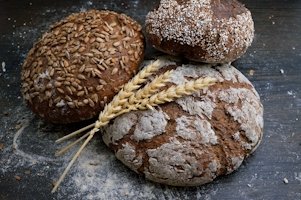The Best Flours for Sourdough: From Pantry Staples to Ancient Grains
Choosing the right flour is one of the most important decisions in sourdough baking. Different sourdough bread flours affect flavor, texture, and rise—and understanding how each one works will help you bake the loaf you’re dreaming of.
Below, we’ll explore traditional flours (all-purpose, bread, whole wheat, rye) and ancient grains (spelt, Kamut, einkorn, emmer), plus tips for swapping between them.
Looking for a Sourdough Bread Recipe?
Click here to browse our collection of sourdough bread recipes to find a new favorite!
Traditional Sourdough Bread Flour
All-Purpose Flour
All-purpose flour is the jack-of-all-trades in sourdough baking. With moderate protein (10–12%), it produces a loaf with a soft crumb and mild flavor—perfect for beginners.
- Hydration: Absorbs less water than bread or whole wheat flour. Reduce water slightly if your dough feels too slack.
- Fermentation: Lower protein means weaker structure—add more stretch and folds to strengthen it.
- Gluten: Creates enough elasticity for decent rise, but not as open a crumb as bread flour.
Tip: Use all-purpose flour if you’re just starting out, or if you prefer a softer, sandwich-style loaf.
Bread Flour
Bread flour (12–14% protein) is a sourdough baker’s best friend. It delivers excellent oven spring, chewy texture, and a stronger gluten network.
- Hydration: Absorbs more water—add a little extra liquid.
- Fermentation: Strong dough structure holds gas well, but watch for over-proofing.
- Starter: Produces a vigorous, bubbly starter.
Tip: Choose bread flour for tall, airy loaves with an open crumb.
Whole Wheat Flour
Whole wheat flour is milled from the entire wheat kernel, making it nutrient-dense with a nutty flavor.
- Hydration: Absorbs more water—start by increasing by 5–10%.
- Fermentation: Slower to ferment, but develops complex flavors.
- Handling: Bran can cut gluten strands, so handle dough gently.
Tip: Great for hearty, rustic loaves. Try blending 20–30% whole wheat with bread flour for balance.
Rye Flour
Rye flour makes flavor-packed sourdough with a dense, moist crumb.
- Hydration: Needs more water—dough will feel sticky.
- Fermentation: Ferments quickly (lots of enzymes) so don’t overproof.
- Starter: Rye-fed starters are famously vigorous.
Tip: Best used in blends (20–50%) for added flavor. 100% rye loaves are dense but deeply satisfying.
Ancient Grains in Sourdough
Spelt Flour
Spelt has a nutty, slightly sweet flavor and a fragile gluten structure.
- Absorbs more water but gluten is weak—don’t make dough too wet.
- Ferments faster than wheat—keep a close eye on proofing.
- Handle gently to avoid tearing gluten.
Tip: Use spelt for loaves with soft texture and delicate flavor.
Kamut (Khorasan Wheat) Flour
Kamut brings a buttery, golden flavor and higher protein than wheat, though its gluten is less elastic.
- Absorbs lots of water—adjust hydration carefully.
- Ferments at a steady pace, but watch elasticity.
- Requires gentle kneading and rest.
Tip: Kamut adds richness and color to sourdough. Best used as part of a blend.
Einkorn Flour
Einkorn is one of the oldest cultivated grains, with a rich, nutty flavor. Its gluten is very weak, so expect a denser loaf.
- Absorbs less water—start with lower hydration.
- Ferments slowly—patience pays off.
- Dough is delicate—avoid over-kneading.
Tip: Best blended with other flours to balance structure.
Emmer (Farro) Flour
Emmer, also called farro, has an earthy, sweet flavor and moderate protein.
- Absorbs moderately—avoid too much water.
- Ferments more slowly than modern wheat.
- Gluten is weak—use stretch-and-folds for strength.
Tip: Adds unique flavor when mixed with bread or all-purpose flour.
How to Swap Flours in Sourdough
Switching flours changes hydration, fermentation speed, and dough strength. Use these guidelines:
- AP → Bread Flour: Equal swap. Expect chewier texture and higher rise.
- AP → Whole Wheat/Spelt/Emmer/Kamut: Replace up to 50%, increase hydration slightly.
- AP → Rye/Einkorn: Replace only 20–25%, as gluten is weak.
Final Thoughts: Choosing the Best Flour for Your Sourdough
Each flour brings something unique:
- Bread flour = strength + open crumb
- All-purpose = soft, beginner-friendly loaves
- Whole wheat/rye = deep, hearty flavor
- Ancient grains = complex taste and rustic character
Experimenting with flours is one of the most exciting parts of sourdough baking. Start with the basics, then add in ancient grains for loaves that are nutritious, flavorful, and uniquely yours.

Pingback: Sourdough Hydration — How to Get It Right Every Time - sourdoughsavvy.com